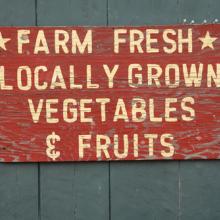Obesity
WE LIVE IN an age of deep fragmentation. Like the ancient Gnostics, who believed in a deep divide between mind and body, we too are inclined to elevate the mind, or the spirit, over the body. The critic Harold Bloom once suggested that the religious practice of most Americans is “closer to ancient Gnostics than to early Christians.”
Ragan Sutterfield’s new memoir, This is My Body: From Obesity to Ironman, My Journey into the True Meaning of Flesh, Spirit, and Deeper Faith, recounts the story of his own struggles amid the fragmentation of our times. Having wrestled with being overweight since his childhood, Sutterfield eventually finds himself with a failing marriage and at his heaviest weight. He is faced with the incongruity that he is an environmentalist and farmer, doing grueling work to care for the land and creation, and yet taking poor care of his own body.
This is My Body is a compelling story of conversion, not unlike St. Augustine’s Confessions, as Sutterfield finds himself drawn out of the typical U.S. sort of Christianity that has little regard for the body and into a deeper faith in Christ, in which spirit and body are deeply interwoven. After the collapse of his first marriage, Sutterfield surrenders himself to the disciplines needed to care better for his body, specifically controlling his diet and becoming serious about exercise. From this conversion point onward, Sutterfield begins to learn and experience an incarnational faith in which our bodies cannot be taken for granted. He writes:
What if God ... became flesh and remains enfleshed? What if God not only has a heart that longs for our love but also a heart that pounds with blood? What if God has skin that drips with sweat? What if the God who offered his body as a sign of love also wants us to experience our bodies as a gift of ... love? Christians must worship a God who is all of these things because we worship a God who was made manifest to us in the human, embodied life of Jesus.
Do you want to know a secret about working out? Here it is: we don’t grow our muscles in the gym. When we lift weights we perform controlled damage to our bodies; we literally tear our muscle fibers, forcing our bodies to adapt. We improve outside of the gym by consuming healthy foods. To “battle the bulge” requires a commitment to strenuous exercise and healthy eating. All who have enjoyed (or endured) a strenuous workout or have disciplined their dietary practices understand that results are impossible without bodily sacrifice — no pain, no gain.
Furthermore, if it is true that we are what we eat, then Christ-followers ought to take a long, hard look at the kinds of things we are putting into our bodies. Paul’s words to the Christ-followers in Rome offer us some food for thought (pardon the pun; couldn’t help myself).
Paul beseeches us to present our bodies as living sacrifices, that is, to submit our lived reality to the standards that God deems acceptable. Such a way of being in the world is deemed reasonable — spiritual even, as the NRSV translators put it. This is our tangible act of service to God.
One of this morning's headlines from Worldcrunch "While You Slept":
"More Than A Third Of The World Is Obese Or Overweight"!
Don't choke on your doughnut until you've looked at the statistics.
No matter how much you hated high-school math, surely you can do better than the people who wrote this headline and the accompanying article.
First, note that 2.1 billion is not "more than a third" of the world's population, which has passed 7.2 billion. It's more like 29%.
While church planners listened, a five-person focus group described life outside the congregation’s doors: A world falling apart.
Families are in disarray, the group said. Parents are refusing, or unable, to do the basic work of parenting, from giving guidance to saying “no.” Instead, they are prepping their children to join a national epidemic of narcissism.
Obesity is rampant, along with obesity-related diseases such as diabetes. Infant mortality is worsening as pregnant girls routinely continue smoking, doing drugs and drinking during pregnancy.
Clueless parents are buying heroin — today’s drug of choice — for their children, so the little ones don’t get beat up by dealers. Parents buy cases of beer for their underage children so they can drink at home, rather than drive drunk. Methamphetamine usage is widespread.
I am not shy about using the saltshaker, and neither I nor anyone else in my family has any sort of problem with blood pressure. That’s because we mostly don’t eat things that come out of packages or from fast-food places (where someone else takes them out of packages), and the salt that is a problem in the North American diet doesn’t come from the saltshaker but from the extreme levels of sodium in packaged foods.
But you will never hear Michelle Obama say that.
There was a similar unutterability to everything having to do with AIDS back in the day. Even when scientists had a fairly clear understanding of the nature of the threat and how it was spread, most “official” speech tended toward a hedging: “we don’t know what causes it; we don’t want to say what’s causing it …” Even today people don’t get tested because they don’t want to know, even though getting tested obviously doesn’t give you the virus — it merely points out that it is there. It seems to point to so much more, though.
As a nutrition student in college, I paid attention to the food we would eat on campus and became keenly aware of how much plastic and material was used and disposed of because of the way our food was packaged. It upset me to see so much packaging thrown in the trash every day. I raised concerns with the Dining Services committee and became a staunch advocate for a better recycling program on campus.
That was my first foray into understanding the relationship between the food system and environmental concerns and their consequent impact on health – something that became a much larger part of my life upon graduation, when I read the book The Omnivore’s Dilemma by Michael Pollan and joined a network of dietitians focused on Hunger & Environmental Nutrition.
The more I read and learned, the more I came to understand the sobering facts about the impacts that our industrial food system has on our society. Power in agriculture has become more and more concentrated over the past several decades, leading to many “monocrops” – large swaths of land devoted to growing only one type of crop rather than a diversity of crops that keeps fields vibrant and healthy. We’ve seen unprecedented extinction of species as a result. Artificial fertilizers lead to soil runoff, nitrous oxide emissions, and pesticides polluting our waterways.
WENDELL BERRY was on stage being interviewed by Bill Moyers when the old Baptist minister (Moyers) asked the unchurched Christian (Berry) about his faith. “The world is maintained every day by the force that created it,” Berry intoned solemnly. In the Old Testament, he noted, “Elihu says to Job, if God gathers his breath, all creatures fail. All creatures live,” Berry emphasized, “by breathing God’s breath, breathing his spirit. It’s all holy—the whole shooting match.”
At 78, Wendell Berry shows no sign of failing, either in his breath or his spirit. But the Kentucky writer-activist-farmer is already enjoying a sort of immortality as the namesake of a degree program in ecological agrarianism at St. Catharine College. In April, that small Catholic institution in Springfield, Ky., hosted a conference titled “From Unsettling to Resettling: What Will It Take to Resettle America?” in honor of the 35th anniversary of Berry’s landmark book, The Unsettling of America. The interview with Moyers was part of the conference program.
Drastically oversimplified, the thesis of The Unsettling of America held that two types of Europeans came to America. Elsewhere, citing his teacher Wallace Stegner, Berry has called them the “boomers” and the “stickers.” The boomers were the unsettlers. They moved into the New World, cut down the trees, extracted the minerals, used up the land, and then moved on in search of new places to despoil. The stickers, however, settled into a place and made it their own. They cooperated with the land and the local resources to make a life and a livelihood that could be sustained over generations. Our problem, Berry contended, is that in America the boomers, backed by the power of money, have for too long set the agenda and won most of the fights.
 There is a dangerous marketing strategy when it comes to food and our children. No, it’s not “sugar” or “fat” or even promotions of “low sugar” or “low fat."
There is a dangerous marketing strategy when it comes to food and our children. No, it’s not “sugar” or “fat” or even promotions of “low sugar” or “low fat."
Most of the food-marketing ploys aimed at kids are contributing to the soaring rate of obesity.
Here’s why, and here’s why it is so personal to me.
I’ve told my story many times of how I struggled with being overweight as a child and teen. The problem wasn’t “baby fa," it was the freedom I had to eat O’Henry bars and ice cream on a daily basis at my grandparents' house. How fun!! Weekly visits to Bullwinkles (does anyone else remember that place?) and McDonald’s made eating exciting!
Back in the 1970’s and '80’s, marketing food to children as entertainment was only making its debut. Now, it’s a multi-billion dollar industry that’s derailing healthy lifestyle patterns for our kids right before our eyes. And we’re OK with that?
Food-related coverage in this issue was supported by ELCA World Hunger (www.elca.org/hunger)
IS OBESITY a “Southern thing,” like drawling accents, gospel music, and excessive devotion to college football? Well, as a native Southerner, I have to admit that increasingly it looks that way.
Obesity is, of course, a national problem. In 1990, 34 states had obesity rates between 10 and 14 percent, but no state had a 15 percent obesity rate. By 2010 every state in the country was more than 20 percent obese.
According to the Centers for Disease Control (CDC), as of 2010 there were 12 states with obesity rates of more than 30 percent. All but one of them are in the South, and that one exception—Michigan—may blame its problem on the many Southern migrants it received during the 1950s and ’60s. And the closer you look, the worse the picture gets. The highest concentrations of obesity were found in six states: Alabama, Louisiana, Mississippi, and South Carolina in the Deep South, and the largely Appalachian states of Kentucky and West Virginia.
The causes of obesity are the same for everyone. You eat too much, you don’t get enough exercise, and you become obese. But why do people eat too much and move too little? As for any human behavior, the causes are complex and ambiguous, but the timing of the obesity outbreak suggests some answers. The upward trend in obesity began in the 1980s and ’90s, when cable TV became widespread in American households, encouraging a couch-potato lifestyle. This was also when the two-income family became the norm. With both parents working full-time, home-cooked meals were often replaced by fat-laden fast-food dinners washed down with giant servings of sugary soda pop. In the subsequent two decades, both of these trends accelerated, with widespread internet access making physical activity even rarer.
IT’S EASY to make the assumption that obesity is an individual problem, having more to do with personal health than with social justice. After all, people make their own decisions about what they put on their plates and how much they put in their mouths.
But many people—and many churches—are starting to see not only the public health consequences of the obesity epidemic, but also the broader forces that contribute to it.
And “epidemic” isn’t too strong a word for the growing problem of obesity. The numbers in the U.S. are unsettling, with startling increases over the past few decades. But the worst may be yet to come, as billions of people in formerly developing countries are gradually globalized into “fast-food nation” lifestyles.
The transition has already begun. According to a recent U.N. report, more than 1 billion people around the world are overweight. Each year excess weight and obesity cause 2.8 million deaths—65 percent of the world’s population now lives in countries where being overweight kills more people than being underweight. And it’s only going to get worse: According to Olivier De Schutter, the U.N. special rapporteur on the right to food, by 2030 as many as 5.1 million people in poor countries will die each year before the age of 60 from unhealthy diets and diet-related diseases such as diabetes, 1.3 million more than today.
The definitions of hunger and malnutrition are changing, and as a result so are the responses—but perhaps not quickly enough.
I love great food. Last night, I made fresh linguini with organic whole wheat flour and local, free-range eggs, and topped them with from-scratch meatballs made with organic beef, fresh parsley from my garden, fresh Parmesan--you get the idea. And in a few days, I’ll be celebrating a special occasion at one of the finest restaurants in the Northeast, where the produce is local and seasonal and sustainable and where the experience of eating is a little like visiting a museum of fine arts where you get to taste all the masterpieces. And yesterday, I planted the first spring vegetables in my garden. I’m a member of Slow Food USA, for cryin’ out loud.
I’m just waiting for the James Beard foundation to give me a badge for being such a morally superior eater.
Except I’m not. Because while the way I eat is motivated by certain ethical considerations (including but not limited to concern for the health of the environment and that of animals), I’m aware that my way of eating is an almost miraculous privilege. I can eat this way because I happen to live in a place where I can buy eggs from a neighbor and grow vegetables in my backyard. I don’t have much money, but I have the luxury of time to grow my own vegetables, to cook from scratch, and enough wiggle room in the budget to buy 25 pounds of organic flour in bulk (which makes it cheaper) without running out of money before the end of the month.
In a stunning new book, The American Way of Eating,Tracie McMillan goes undercover in farm fields, in the Wal-Mart produce department, and at Applebee’s to explore common assumptions that food-movement types make about the way many Americans eat: that many of us are overweight and unhealthy because we just don’t “care” enough about the quality of our food--with people who are poor “caring” the least. Throughout the book, which chronicles her numerous conversations with low-wage co-workers, McMillan fiercely defends her conviction that everyone--everyone--wants to eat well.
Bread for the World has many recommendations in the new report, but I’d like to highlight just one for now: “Farm policies should lean more towards the production of healthy foods.”
Why this one? Most farm subsidies go to (wait for it) the largest, wealthiest producers (shocking, right?). Billions of dollars are spent subsidizing corn, wheat, soybeans, cotton and rice. Small and medium-size producers (many of whom grow vegetables — the foods that are supposed to make up half our dinner plate) receive little, if any, support from the current U.S. farm policy.
Securing affordable, healthy foods for our country’s poorest will in turn help us address other issues such as malnutrition and obesity, immigration, health care, and employment.
Documentary filmmaker Morgan Spurlock is not afraid to get messy.
“Lord, to those who hunger, give bread. And to those who have bread, give the hunger for justice.”
—Latin American prayer
I love grocery shopping. The tidy rows of boxes and cans, the perfect mounds of fruit, the wheeling of carts, the checking of lists, the whoosh of the automatic mister that leaves the leafy greens sparkling. I even like the Muzak.
So last summer, to celebrate the grand opening of a Super Giant grocery store in Washington, D.C.’s Columbia Heights neighborhood, I walked five blocks to buy flour for my fiancé’s birthday cake. Behind the renovated Tivoli Square complex, which now houses the Sojourners office, I found a gala underway: red, white, and blue bunting, a live salsa band, and shoppers scrambling for the opening-day sales.
I was impressed by the row of gleaming registers (no more long lines at the dingy Safeway on Columbia Road), the piles of fresh produce (no more wilted lettuce from the tiny SuperSave on Mount Pleasant Street, though it did have homemade tamales and a cashier who knew my name), and an entire aisle of organic options (no more car trips to Glut food co-op in Mount Rainier, Maryland). Also, I’d heard talk in the neighborhood about all the new jobs, and sure enough, there was an army of green-aproned cashiers and stockers.







